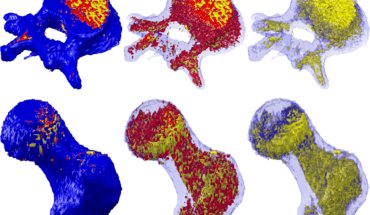Psoriasis and psoriatic arthritis treatment shift: Around 250,000 people in Austria suffer from psoriasis. One third of them develop inflammation in their joints (psoriatic arthritis) as a result of the chronic skin condition. As part of a study, a MedUni Vienna research team has now discovered a key starting point for inhibiting inflammation in both psoriasis and psoriatic arthritis. The researchers’ findings may form the basis for developing new treatment, diagnostic and prevention strategies. The study has now been published in the renowned journal “Annals of the Rheumatic Diseases”.
The study conducted by the research group led by Erwin Wagner (Department of Dermatology and Department of Laboratory Medicine, MedUni Vienna) focused on the S100A9 gene, which has long been at the centre of its internationally acclaimed scientific research into psoriasis. The team has discovered that the severity of psoriasis (Ps) and psoriatic arthritis (PsA) can be reduced by inhibiting S100A9 systemically throughout the whole body rather than locally on the skin.
With this finding, the MedUni Vienna researchers are laying the foundation for a paradigm shift in the treatment of Ps and PsA: “Our study is an important step towards the development of targeted therapeutic options in the form of drugs that act systemically rather than locally on the skin,” affirms Erwin Wagner. New diagnostic and prevention strategies can also build on the study.
Deciphered in preclinical experiments
Psoriasis is one of the most common chronic inflammatory skin conditions that can also spread to the joints. Triggers for the disease, which usually first appears in adulthood, include stress and UV radiation. However, individuals can also be genetically predisposed to developing Ps. S100A9 activation in skin and immune cells has been identified as a risk factor for the development of Ps and/or PsA.
As shown by previous basic research by Erwin Wagner’s team at MedUni Vienna, the symptoms of psoriasis disappear when the S100A9 gene is deactivated in all cells of the body. The recent preclinical experiments were able to shed light on the particular influence that the skin and immune cells in which S100A9 is produced have on disease severity. “We now know that the inflammatory responses in psoriasis and psoriatic arthritis are enhanced when S100A9 is only inhibited in skin cells,” Erwin Wagner explains, summarising the main finding of the study. Therefore drugs inhibiting S100A9 have to be administered systemically in the form of tablets or drips.
Published in: Annals of the Rheumatic Diseases
Keratinocyte-derived S100A9 modulates neutrophil infiltration and affects psoriasis-like skin and joint disease
Liliana F. Mellor, Nuria Gago-Lopez, Latifa Bakiri, Felix N. Schmidt, Björn Busse, Simon Rauber, Maria Jimenez, Diego Megías, Sergio Oterino-Sogo, Ricardo Sanchez-Prieto, Sergei Grivennikov, Xinzhu Pu, Julia T. Oxford, Andreas Ramming, Georg Schett, Erwin F. Wagner
DOI: http://dx.doi.org/10.1136/annrheumdis-2022-222229
- Gut microbiome could delay onset of type 1 diabetes - 3rd April 2025
- The da Vinci 5 Robot Is Set To Transform Bariatric Care: - 31st March 2025
- Beyond money: the hidden drivers fuelling child food insecurity - 31st March 2025






